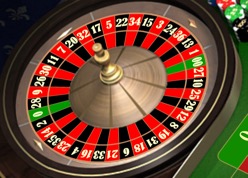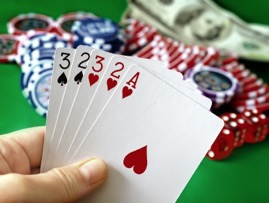A growing gambling problem
18/10/16 13:44

What is FOBT?
Problem gambling is not just about losing money. It’s a compulsion which can destroy families. The main focus for most addicted gamblers is now not just the machines found in the high street bookmakers, but is more likely to be found through the convenience of an online betting site or a betting app on a smartphone.
Most gamblers lose money over many years and often manage to hide their activities from the ones they love most. This in itself promotes, stress born out of the shame of lying and deceiving, which in turn can lead to a number of general anxiety disorders.
So called fixed odd betting terminals or FOBTs are one of the most common outlets for betting. Online roulette, among other FOBTs can be found in every betting shop across Britain. FOBTs appeal, for want of a better word, offer the dangerous combination of high stakes and the chance to win quick returns. This powerful illusion of getting rich quick can often lead to the gambler losing sight of what’s important. There are an estimated three quarters of a million problem at risk gamblers across the UK.
So what makes FOBTs so addictive? What makes people play at the expense of friendships, family and relationships. Gamblers themselves are the first to admit how it is easy to get lost in this world they find themselves immersed in. One of my clients recently admitted to having been able to lose more than three thousand pounds in less than an hour. This is not unusual however, such is the pull of the FOBT addiction. Is it any wonder that the guilt, shame, embarrassment of losing vast amounts of money in such a short period of time makes most gamblers lie about their behaviour and try to deny to themselves and others that there is a real problem.
The fixed odds betting terminals offer mostly games of chance, but most people play roulette. The occasional wins unfortunately are responsible for a release of a hormone into our bodies known as dopamine, which stimulates that feeling associated with every kind of addiction, from eating chocolate to drinking alcohol to betting on 32 red on a roulette wheel. The problem is not that the feeling of winning is bad its the fact that it confuses the reality of that occasional win being far outweighed statistically by the dozens of losses which eventually lead to ruin. The ‘high’ experienced through the release of dopamine means that a gambler will go to any lengths to experience more and more of the same feeling even after having lost, even if that means chasing those losses and convincing themselves that there is some way to recover. A spiral of despair as the losses grow means the gambler will stop thinking with the neo-cortex or logical brain, and instead think more with the completely emotionally driven part of the brain. This is when it becomes very dangerous because the losing gambler at this point is not thinking rationally but instead being led by a completely separate entity hell bent on recovering at any cost but often with FOBTs that means total and complete ruin in the long term and even often in the short term.
Gamblers are prone with FOBTs to seeing patterns where there really aren’t any. They convince themselves that the numbers the ball landed on in the past must somehow give them a statistical edge. Of course this isn’t true and the FOBT promoters deliberately count on this illogical rationale to deliver what always ends up being the ‘house edge’ at the expense of the unsuspecting punter.
The spinning of the wheel, the noises and the experience generated by the FOBT is all designed to ‘pull in’ the gambler even though they have no effect on the result. Of course the result is always completely random.
Most scientists would argue that once you are addicted it is very hard to stop. I would argue, however, that gambling and the feelings associated with gambling are emotional in source and therefore any area of the brain which has learned to associate emotionally can either replace those emotions with new more powerful counter balancing emotions or can simply unlearn the habit at an emotional subconscious level. Either way the effect is the same if the thought behind the behaviour is no longer stimulating excitement or enjoyment because the levels of dopamine have been reduced, then the addiction begins to break down at an emotional level and can in effect be eradicated. Through my ten years of contact with seriously addicted gamblers, and not just those addicted to FOBTs, I have developed hypnotic techniques which in effect neutralise the reward centre of the brain by shifting awareness and perception. This approach has had great success with a full range of gambling activities, not least FOBTs and continues to challenge any notion that once a gambler always a gambler.
The way hypnotherapy works with the gambling habit is well covered on this website, but the area of FOBTs is a growing problem and one which threatens to enrol a new more ‘smartphone’ vulnerable generation of young gamblers who are already being seduced by seemingly harmless online games which at their heart have only one objective and that is to stimulate betting, and spending behaviours. That is why I wanted to write down why I believe we must be more mindful of the dangers we might face, either as a parent, a friend, a concerned partner or of course a current practicing gambler who can relate to much of the material here
Watch previous testimonials here
https://www.youtube.com/watch?v=IwIQ3JJMe6A
If you are currently struggling and would like to know how hypnotherapy can help you challenge and defeat your gambling addiction then simply request a completely confidential free consultation by clicking here, and I will be happy to explain how I can help.
Wishing you the very best with your search
David Faratian
NLP Practitioner and Clinical Hypnotherapist
Gambling your life away
19/01/16 14:25


A few weeks ago one of my clients, John (name changed) from Kendal in Cumbria came to see me about his problem with gambling. This gentleman was suffering from a life which had been destroyed by his inability to look beyond his infrequent wins. He was completely addicted to the idea of horse racing (real and virtual) and over the course of a number of years had managed to lose over £50,000. This was clearly a serious problem for him. Not only had it ruined him financially but it had also taken away his life socially and personally. His inability to walk past the temptation of maybe being able to ‘win this time’ had meant that he was alienating him self from every relationship and was even being stopped from seeing his own children because the relationship with his partner had broken down to such an extent. The desperation on this man's face was clear when he first came to see me. Attending gambling anonymous had not helped and simply talking about it in some kind of counselling context had been equally ineffective. What could be done?
John’s problem is very common indeed and in fact affects over 40% of the adult population based on data as recent as 2014. With any addict the problem is always associated with the emotional feelings created by an artificial release of a powerful hormone into the system called dopamine. The problem with dopamine is that once it gets into your system and gives you that thrill feeling you require twice as much next time to get to the same level you experienced the first time. It is the surge of excitement associated with the initial thrill which leads to the need for gambling strengthening and eventually becoming addictive. Unfortunately once someone is addicted, then the priorities in a person’s life shift and person can become isolated and detached to the point where they are unable to see clearly or make rational judgements.
Through the treatment I was able to offer John we were able to disassociate him from the emotions that he felt around the idea of winning a particular horse race and therefore neutralising the release of dopamine. In effect there was no longer any thrill associated with the idea of winning so therefore the thought of gambling very quickly lost its interest. This approach is highly effective for this particular addiction if the person can engage with the creative process. Hypnotherapy and hypnosis as well as a combination of other psychological tools like neurolinguistic programming are powerful when it comes to dealing with limiting behaviours like gambling because they make the shift back to rational thinking effortless and automatic. Thankfully ‘John’ is now in a much better place and is managing to his life back on track, looking forward to making this a very positive year (2016 at the time of writing this blog). This was what he had to report recently.....
“ I have my head sorted out with thanks to yourself, am in a good place and think about things in a different perspective, to what I use to, am am busy taking my father for his treatment at this present moment in time, thanks for all your help if I ever need you I will be in touch, and I will highly recommend you to people, thanks again “
With a decade of experience The Cumbria Hypnosis habit change clinic serves the entire Cumbria and South lakes region, including Kendal and Lancaster. If you would like to find out more about the power of hypnotherapy to deal with an addiction like gambling then click HERE to be redirected to our dedicated page.


